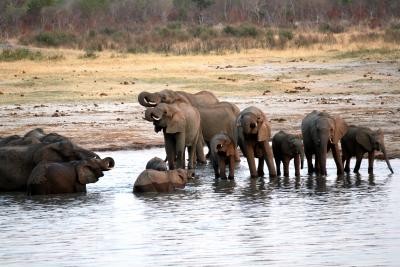
Harare, Amid an ongoing drought, the Zimbabwe National Parks and Wildlife Management Authority (ZimParks) said it has relocated 100 elephants since July and a significant number of other wild animals from the arid southern parts of the country to the north where there is better vegetation and water.
ZimParks spokesperson Tinashe Farawo told Xinhua news agency on Wednesday that the Authority issued permits for the transfer of 2,650 animals from the Save Valley Conservancy to three national parks in the north namely Tsapi, Chizarira and Matusadonha.
The animals targeted for relocation include 400 elephants, 2,000 impalas, 70 giraffes, 50 zebras, 50 buffaloes, 50 elands, 10 lions and 10 wild dogs.
The relocation exercise began in July and so far, 100 elephants and a "significant number of other wild animals" had been relocated, he said.
He said the main reason for relocation was to depopulate overcrowded areas and create a balance in the ecosystem.
Climate change induced-drought resulting in loss of habitat, food, and water was posing a risk to the animals and the only way to protect the habitat was to make sure that we create a balance by relieving pressure on overcrowded areas, Farawo said.
Zimbabwe has become prone to frequent droughts in recent years due to climate change, posing the risk of hunger not only to humans but also to wild animals.
The country has an overpopulation of elephants numbering over 100,000 against an ecological carrying capacity of 45,000.
The jumbos are located in four main ecological zones, and two of the zones are overpopulated.
The four zones are North West Matabeleland where the country's biggest game park Hwange is located; South East Lowveld, home to the second biggest park Gonarezhou; as well as the Sebungwe region and mid Zambezi in the northern part of the country.
This is not the first time that ZimParks has moved the animals.
In 2018, it moved 100 elephants from the South East Lowveld to mid Zambezi while plans to relocate 600 elephants in 2020 were affected by the Covid-19 pandemic.
The relocation program is an expensive exercise and ZimParks has in the past lamented inadequate funds to successfully carry out the program.


.jpeg)

